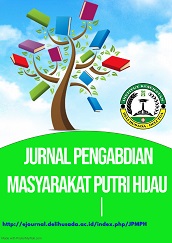PENYULUHAN IMPLEMENTASI PERSONAL RISK ASSESSMENT TERHADAP WORK RELATED MUSCULOSKELETAL DISORDER SYNDROM (WMSDs) PADA LOADERMAN AREA PACKING PLANT PT SOLUSI BANGUN ANDALAS
Abstract
Work Related Musculoskeletal Disorder Syndrome (WMSDs) is a group of disorders of muscles, tendons, and nervous system caused by repeated and continuous static loads for a certain period it will cause damage to joints, ligaments, and tendons. The purpose of this research is to find out whether the implementation of the Personal Risk Assessment program has been effective in preventing the risk of musculoskeletal disorders on the loader man at packing plant Solusi Bangun Andalas Inc area, by analyzing the relationship of factors thought to be associated cause WMSDs, namely workload, work posture, repetition, duration, and vibration. This research is quantitative with a cross-sectional method. Data was collected by distributing Rapid Entire Body Assessment (REBA) and Nordic Body Map (NBM) worksheet questionnaires to 30 samples. Data analysis was performed in univariate and bivariate using the Chi-Square test. The results of the workload test with complaints of WMSDs got a p-value of 0.005, work posture with complaints of WMSDs with a result of p 0.004, repetitions with complaints of WMSDs with a result of p 0.013, duration with complaints of WMSDs with a result of 0.008 and vibration with complaints of WMSDs with a result of 0.002, and the conclusion show that the Personal Risk Assessment program is ineffective in preventing WMSDs risk












